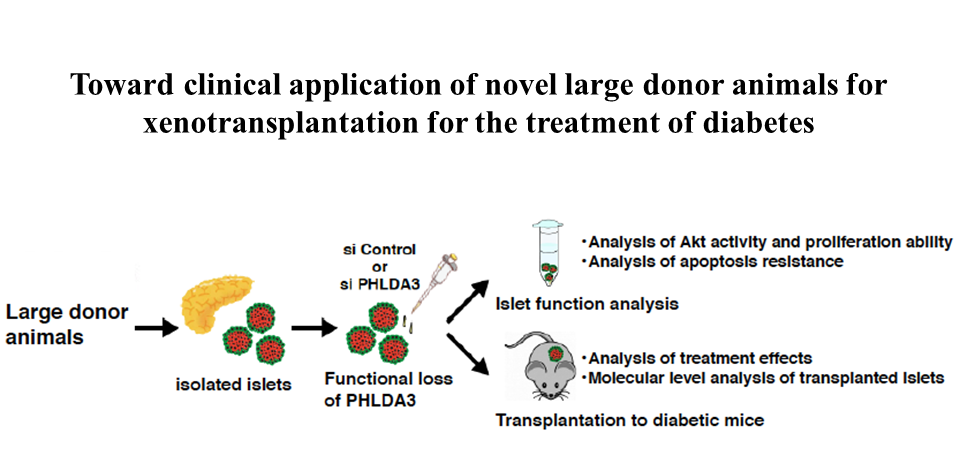Toward clinical application of novel large donor animals for xenotransplantation for the treatment of diabetes
Abstract
This project will conduct basic research for the clinical application of novel large donor animals for xenotransplantation for the treatment of diabetes.
The pancreas is an organ in which exocrine glands occupy more than approximately 90% of its area, and islets, in which endocrine cells gather, float and exist in the pancreas. When islet function fails and insulin secretion becomes abnormal, diabetes develops. Islet transplantation has been performed as a treatment for diabetic patients, but unfortunately, the results are not satisfactory and various issues need to be overcome. In particular, donor pancreases for islet transplantation are in short supply even now that brain-dead organ donation has become available. In addition, many islets are lost due to stress and rejection during islet transplantation, and the remaining islets have significantly reduced insulin secretory capacity. To overcome these problems, it is necessary to create new donor animals that have many islets with excellent islet function and resistance to stress in the early stage of islet transplantation.
Large donor animals that are homologous to human insulin are ideal donors for xenotransplantation because a single animal can provide the number of islets needed for transplantation in a single patient. However, islets are very fragile, and some ingenuity is required for their effective utilization. We have previously shown that PHLDA3 is a repressor of the oncogene Akt. We have also shown that PHLDA3 deficient mice exhibit increased islet cell proliferation, islet hyperplasia, and acquisition of islet cell stress resistance due to elevated Akt activity in islet cells. Furthermore, we have shown that islet transplantation efficiency is increased by using PHLDA3 deficient islets. Based on these results, we are conducting research using islets from large animals with suppressed PHLDA3 function as a basis for future clinical applications as novel large donor animals for xenotransplantation for the treatment of diabetes.

Perspectives
Xenotransplantation using large animals is one of the means to solve the problem of islet transplantation, which is the shortage of donors. The quality of islets to be transplanted is crucial to improve the outcome of islet transplantation by xenotransplantation. The creation of large donor animals with a large number of strong and well-functioning islets is a possible solution to this problem, and large animals with suppressed PHLDA3 function are very suitable donors for this purpose. This study will prove the efficacy of PHLDA3 function suppression in islet transplantation in large animals and establish a basis for clinical application of large animals with suppressed PHLDA3 function as islet transplantation donors.
Comments from principal researcher
Yu CHEN (National Cancer Center Research Institute・Laboratory of Fundamental Oncology・ Researcher)
By using islets from large animals with suppressed PHLDA3 function, it is expected that it will be possible to prepare the necessary amount of highly functional islets when needed. In cooperation with Japan's leading experts in islet and diabetes research, we expect to obtain fruitful research results that will surely lead to diabetes treatment through joint research in different specialties.

Shared Researchers
Koya Shinohara(National Center for Global Health and Medicine Research Institute・Department of Pancreatic Islet Cell Transplantation)
Masayuki Shimoda (National Center for Global Health and Medicine Research Institute・Department of Pancreatic Islet Cell Transplantation)
